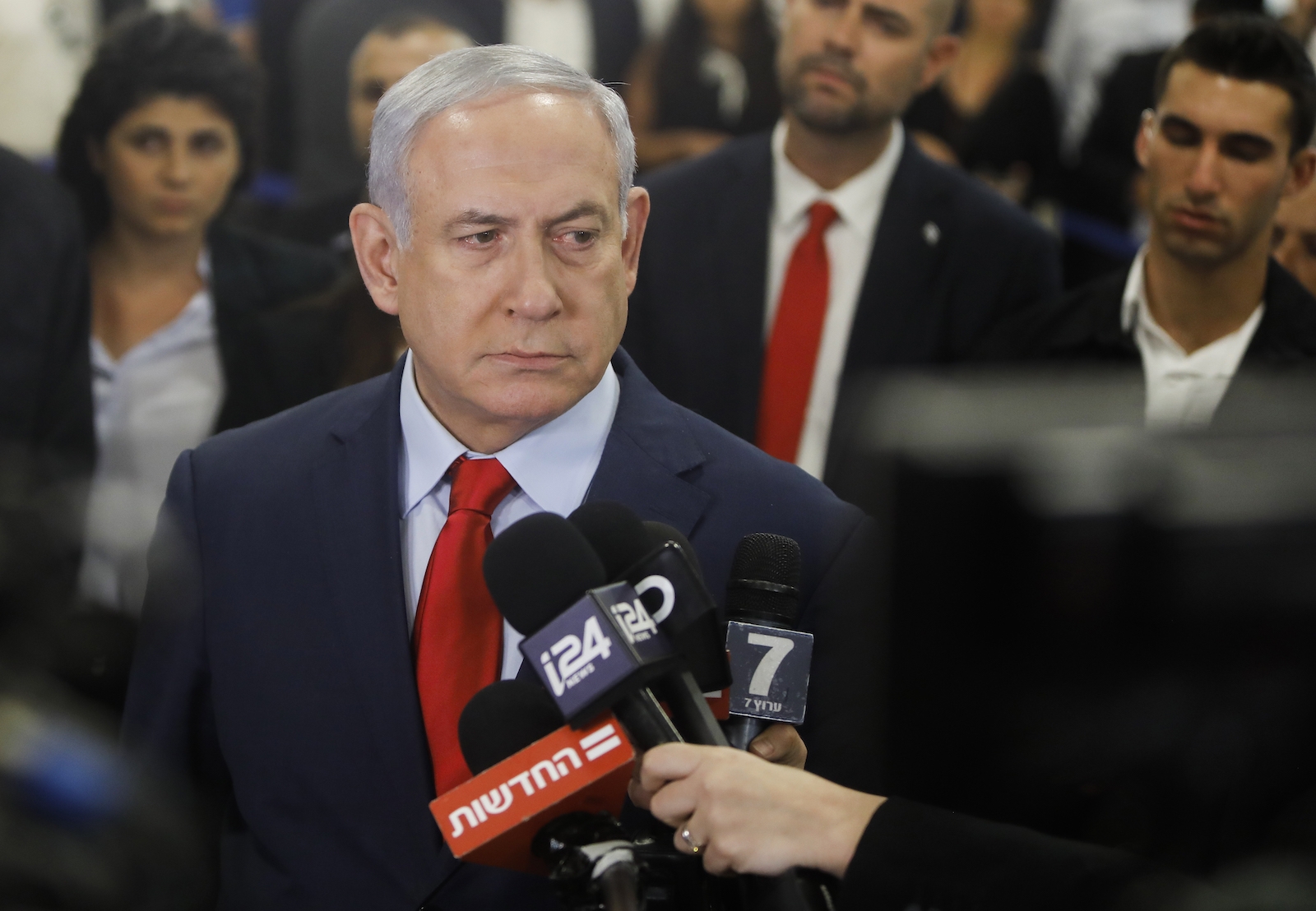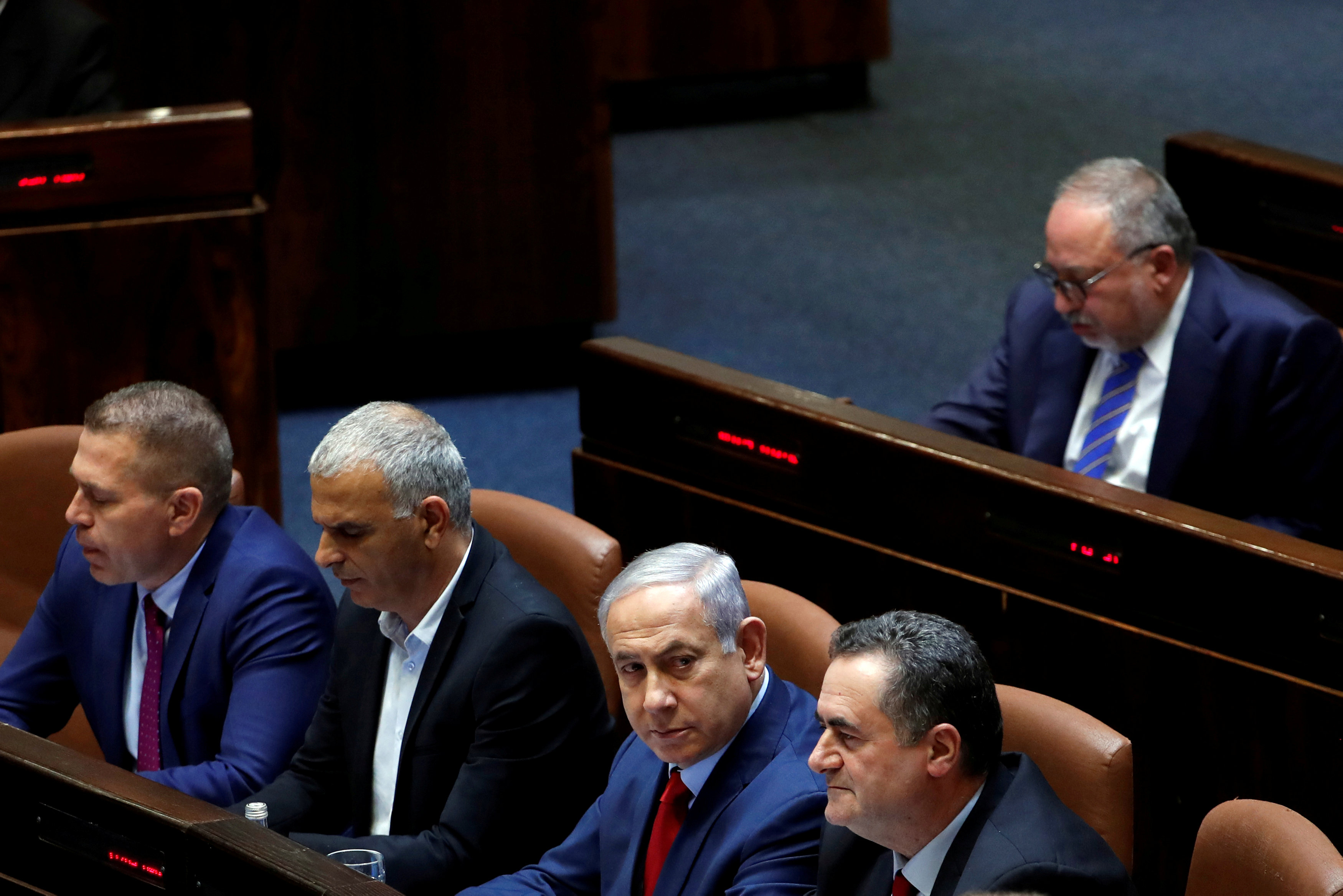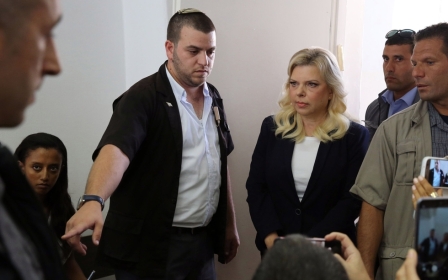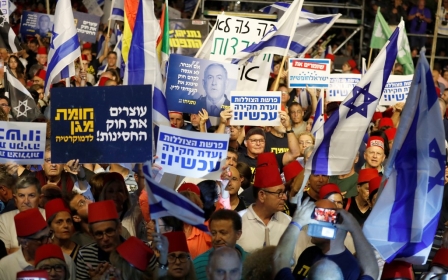Israeli parliament votes to hold new election in September

The Israeli parliament has voted 74-45 to dissolve itself and hold new elections after Prime Minister Benjamin Netanyahu failed to form a ruling coalition government before a midnight deadline.
The Knesset's dissolution just after 9pm GMT on Wednesday, only seven weeks after a parliamentary vote was held, sets Israel on course for a new election on 17 September.
"We will run a sharp, clear election campaign which will bring us victory," Netanyahu told reporters after the Knesset vote.
"We will win, we will win and the public will win."
Israel’s political crisis: A timeline
+ Show - Hide14 November 2018
Defence Minister Avigdor Lieberman withdraws from Israel’s governing coalition in protest against ceasefire talks with Hamas, leaving Benjamin Netanyahu’s government with only a slight majority in parliament.
19 November 2018
After emergency talks, Netanyahu avoids a snap election when far-right Education Minister Naftali Bennett drops his threat to collapse the coalition if he is not made defence minister.
2 December 2018
Israeli police recommend corruption charges against Netanyahu for allegedly offering telecoms company Bezeg better contracts in exchange for positive coverage in a news website under the same owner.
24 December 2018
After resisting pressure and following weeks of infighting in his cabinet, especially over a military exemption bill affecting ultra-Orthodox Jews, Netanyahu calls a snap election for April 2019.
21 February 2019
Netanyahu’s strongest opponents, including three former military chiefs, launch the Blue and White political alliance aimed at ending the prime minister’s decade in power. The two strongest candidates, Benny Gantz and Yair Lapid, agree to rotate the role of premier if they win.
9 April 2019
Netanyahu wins a record fifth term as prime minister. Though Blue and White equalled the number of seats as his Likud party, the number of seats won by Netanyahu’s right-wing allies put him in the strongest position to form a government.
25 May 2019
Thousands of Israelis from all political parties protest against Netanyahu and suggestions his party will fight to grant him immunity against corruption charges
27 May 2019
Netanyahu vows to build a coalition despite his failure to secure an agreement more than a month after the election and with only 48 hours until the deadline to form a government passes. Lieberman refuses Netanyahu’s request to join the coalition.
29 May 2019
Netanyahu misses his deadline to form a coalition and the Israeli parliament votes for new elections on 17 September 2019.
Netanyahu, whose Likud party won 35 seats in parliamentary elections on 9 April, has struggled to form the political coalition he needed to get a majority of the seats in Israel's 120-member parliament, the Knesset.
New MEE newsletter: Jerusalem Dispatch
Sign up to get the latest insights and analysis on Israel-Palestine, alongside Turkey Unpacked and other MEE newsletters
In particular, the Israeli premier was unable to get the support of the far-right Yisrael Beitenu Party, which won five Knesset seats last month under the leadership of his former defence minister, Avigdor Lieberman.
Yisrael Beitenu has been at odds with ultra-Orthodox parties Shas and United Torah Judaism over a military conscription bill - and Lieberman said he would not serve in a government alongside them.
That bill would make it mandatory for Haredi men studying the Torah to join Israel's armed forces, a requirement from which they have been exempted.
Lieberman has long said that all Israeli men must equally share the burden of military service.
On his Facebook page on Wednesday, Lieberman blamed Likud for the repeat election, saying the party had refused to vote on the ultra-Orthodox draft bill, Israel's Haaretz newspaper reported.
Netanyahu, for his part, slammed the Yisrael Beitenu leader, saying Lieberman "brings down right-wing governments" only "because he wants a few more votes, which he won't get".
"It's just unbelievable," said Netanyahu, as reported by Haaretz.
Netanyahu in hot legal water
The prime minister faces three looming indictments for corruption, and public attention had been focused less on coalition-building and more on moves Netanyahu loyalists were planning in parliament to grant him immunity.
Case 1,000 involves Netanyahu and his family allegedly receiving luxury gifts in exchange for personal or financial favours.
In Case 2,000, he is suspected of attempting to alter media coverage, allegedly attempting to broker a secret deal with the publisher of the bestselling newspaper Yediot Aharonot.
That deal sought favourable coverage in return for pursuing legislation that would have limited the circulation of one of the papers’ rivals.
The most serious indictment, Case 4,000, suspects him of offering regulatory benefits to Bezeq telecoms firm in return for its media arm providing positive coverage.
Netanyahu has denied any wrongdoing in the cases and is due to argue at a pre-trial hearing at the beginning of October against the attorney general's intention, announced in February, to indict him on bribery and fraud charges.
The new election date, coming just two weeks before the hearing, appears to scupper Netanyahu's chances of gaining immunity before the pre-trial, even if he were to win the poll.
US peace deal
A new election may also complicate US efforts to press ahead with President Donald Trump's peace plan in the Israeli-Palestinian conflict, dubbed the "deal of the century".
Palestinians have already rejected the peace deal as a blow to their aspirations for statehood.
The White House team behind the proposal, including Trump's son-in-law Jared Kushner, is currently in the Middle East to drum up support for an economic "workshop" in Bahrain next month to encourage investment in the occupied West Bank and Gaza Strip.
On Tuesday, ahead of Kushner's visit to Jordan on Wednesday, hundreds of political and public activists staged a sit-in near the US embassy in Amman, urging Jordan not to attend the Bahrain summit
The US team is due in Israel on Thursday.
Middle East Eye delivers independent and unrivalled coverage and analysis of the Middle East, North Africa and beyond. To learn more about republishing this content and the associated fees, please fill out this form. More about MEE can be found here.





